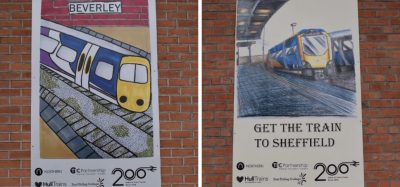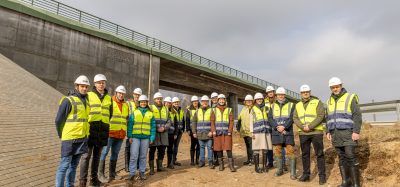NSAR’s Skill Symposium discuss training and the workforce
Posted: 24 November 2023 | Emily Budgen | No comments yet
NSAR’s Skill Symposium took place on the 17th November, and was a complete success, covering topics such as skills, training, and workforces.
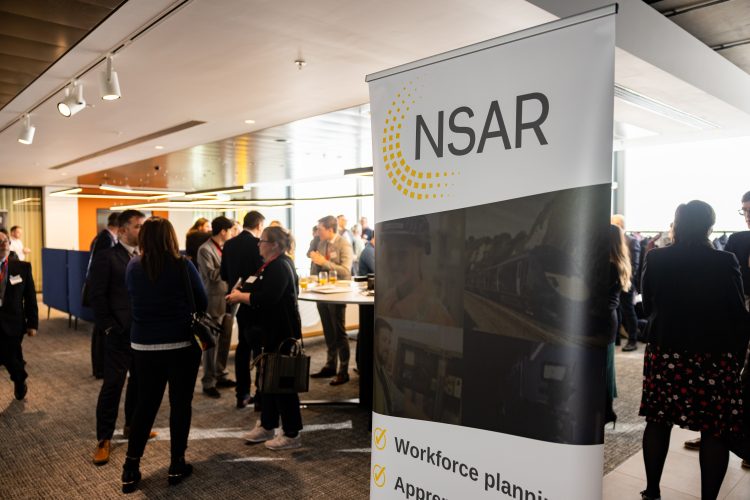

The National Skills Academy for Rail (NSAR) hosted its Skill Symposium on Friday 17th November. After NSAR’s AGM, attendees were invited to a short networking session, over tea and coffee. Here, attendees were not only able to discuss topics brought up in the AGM, but also meet other professionals from the rail industry. There was much anticipation for the program ahead, with three speakers all specialised in various areas of rail, scheduled to contribute.
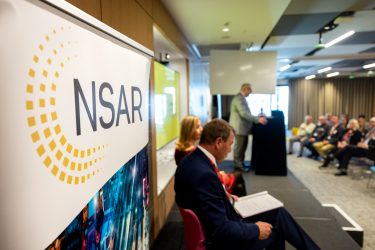

NSAR is a not-for-profit membership organisation – the connection between the rail industry, government, and training providers. Since its establishment in 2010, these services have expanded to include expert skills and workforce consultancy to businesses in the rail, transport, and infrastructure industries. Founded in the UK, NSAR now responds to the international community, with companies based across the globe counting as its members. Dyan Perry OBE, Chair of NSAR, in their annual report, emphasised that ‘NSAR aims to play a more active role in supporting employers’ and that she ‘looks forward to seeing how this work progresses in 2024’.
The Chief Executive Neil Robertson opened the Skills Symposium with the question “what is a symposium?”, before responding that he was not entirely sure of the answer. However, Robertson’s approach gave a sense of freedom to the conference. He went on to clarify that the label ‘symposium’ gave NSAR the freedom to play not only with the format of the event, but also the themes discussed. An idea that reflected the different topics discussed by the speakers.
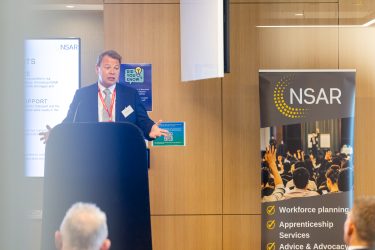

The first speaker at the event was Lydia Fairman BEM FCIPD, who is Head of Capability and Skills Development at Network Rail. Fairman specialises in building skills within the rail sector, which was evidenced in her speech. Fairman commented on the Shapps-Williams whitepaper, delving into the current issues surrounding workforce diversity in the rail sector. While acknowledging that the paper is “not all good reading”, particularly when addressing the lack of younger people in the rail industry (10% were under the age of 25 in 2016, this has since dropped to 4%), Fairman put forward a range of applicable solutions. The rail sector must “focus on that pipeline coming in”, before “recruiting more people than we might need”.
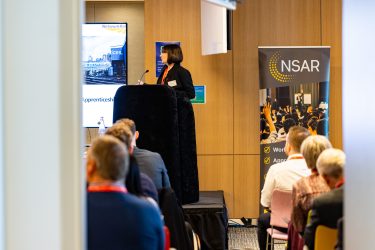

Part of this scheme would include employing more apprentices; Fairman emphasised to the audience that “bringing apprentices into your organisation” not only helps diversify the workforce, as well as perhaps securing future trained employees, but also that apprentices “bring creativity” – a fresh approach to the industry. Nevertheless, a key aspect of the approach would include pre-apprenticeship outreach. Fairman argued for a greater focus on “work experience, T-levels”, and an “innovative approach” to “springboard careers”. Speaking directly to the audience, most of whom were industry professionals, Fairman emphasised that they very much could “make a difference”.
After Fairman’s opening speech, focusing predominantly on the importance of an incoming workforce, the next speaker was Robert Forde ChPP, the Director of Skills and Strategy at GCRE. Here, Forde used the opportunity of his speech to convey not only what the GCRE site will offer the rail industry, but also why its construction is integral to infrastructure developments in the UK and across Europe.
The GCRE site is, to quote Forde, “purpose-built”, and will provide an opportunity to “showcase” the industry’s technology. Currently in the UK, there is a “three-year waiting period” to test new rail infrastructure, due to the lack of testing sites. With GCRE’s opening, developers in the UK and Europe will be able to test their technologies and software in a new environment, minimising the current waiting times. As Forde presented, this will “reduce the time it takes from idea to implementation.”
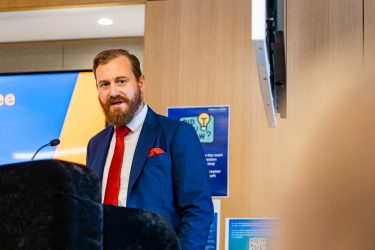

Listeners to Forde’s address were left in no doubt of the scale and opportunities the GCRE site will offer. Measuring 700 hectares, or roughly the size of Gibraltar, or, alternatively, the size of Disneyland Paris (the audience were able to choose their comparative point of reference), GCRE will be a veritable “playground for railway engineers”, where certain environments can be simulated for safety testing.
Additionally, Forde emphasised the effect the opening of the site would have on the local community and workforce. The average age of a rail industry worker is 45, with only 10% of the workforce under the age of 30. Within this mix, only 16% of the workforce are female and 87% of rail industry workers are white. Forde concluded the figures with “you can’t be, what you can’t see”, echoing Fairman’s previous message to the audience regarding the importance of outreach.
The GCRE site, in Port Neath Talbot, Wales, an area with one of the “highest levels of industrial inactivity” will not only introduce new jobs into the area, but also promote world-class STEM research. With the “technology and space” offered, there is an opportunity to offer a “worldclass skills programme” for anyone interested in the rail or wider engineering industry.
The final speaker of the Skills Symposium was Josh Brear, the Fleet Competence Manager from East Midlands Railway. Having previously been 180 Deputy Team Leader at the same company, Brear was first an apprentice. In his speech, he focused on the current assessment schemes in place for those in traineeships in the rail sector.
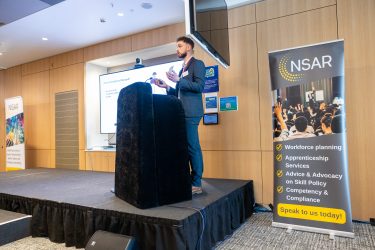

Brear first outlined what ‘competence’ entails in the rail sphere, how it is determined, and why it is integral to the functioning of the industry. Even though there were many instances where the industry succeeds, in training and in practice, Brear suggested a nuanced approach to skills assessment in the training and apprenticeship schemes in the rail sector.
As well as technical skills, currently included in all training and assessment schemes, Brear emphasised the “importance of non-technical skills in the rail industry”. By using a relatable example, taking a driving test, Brear used the most common reasons for failure as a comparison, noting the two top non-technical issues that lead to failure – mistakes at a junction and forgetting to check mirrors.
Through this example, Brear demonstrated how a lack of non-technical skills are key to reducing failures or mistakes in the rail industry but lamented that they are still not included in most assessments.
“We need to bring non-technical skills to the top”, said Brear, before laying out a series of possible solutions which would follow in this vein. At the top of the list was integration of NTS and a skills ID project launch, as well as updates to EMR CMS standards, for the inclusion of non-technical skills.
In a follow up comment on social media, after the conclusion of the symposium, Brear wrote ‘[technical skills are] crucial to improving the safety, reliability & performance of the railway industry, & I look forward to where it can take us!’
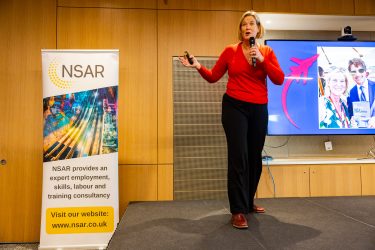

The Skills Symposium then concluded with an inspiring keynote speech from Mandy Hickson, the first woman to fly the Tornado GR4 on the front line, who gave the audience an insight to a career spanning over thirty years within aviation and completing three tours of duty. Hickson told the audience about the numerous challenges she experienced, and how, through both team and individual hard work, she was able to overcome these.
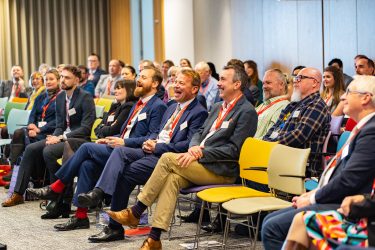

NSAR’s fantastic event thus concluded, with the audience having learned various ways to innovate the rail skills and training sectors.
More Like This
The King’s Speech: Head of ZF Aftermarket Reacts
Art and Railway: Creative Communities
King’s Speech Outlines Proposed Railway Reforms and Policies
Related topics
Conferences & Events, Funding & Finance, Infrastructure Developments, Passenger Experience/Satisfaction, Passengers With Reduced Mobility (PRM), Rolling Stock Maintenance, The Workforce, Track/Infrastructure Maintenance & Engineering, Training & Development
Related organisations
EMR, Global Centre for Rail Excellence (GCRE), National Skills Academy for Rail (NSAR), Network Rail
Related people
Dyan Perry, Josh Brear, Lydia Fairman, Neil Robertson, Rob Forde




